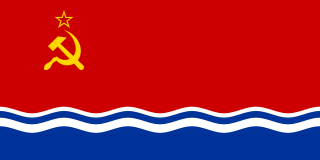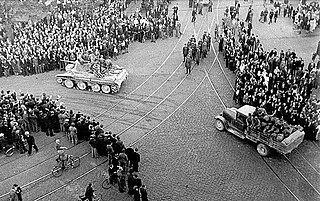
Latvia, officially the Republic of Latvia, is a country in the Baltic region of Northern Europe. It is one of the Baltic states; and is bordered by Estonia to the north, Lithuania to the south, Russia to the east, Belarus to the southeast, and shares a maritime border with Sweden to the west. Latvia covers an area of 64,589 km2 (24,938 sq mi), with a population of 1.9 million. The country has a temperate seasonal climate. Its capital and largest city is Riga. Latvians belong to the ethno-linguistic group of the Balts; and speak Latvian, one of the only two surviving Baltic languages. Russians are the most prominent minority in the country, at almost a quarter of the population.

The Latvian Soviet Socialist Republic, also known as Soviet Latvia, was a republic of the Soviet Union with equal rights from 5 August 1940.

The Baltic states of Estonia, Latvia and Lithuania were invaded and occupied in June 1940 by the Soviet Union, under the leadership of Stalin and auspices of the Molotov-Ribbentrop Pact that had been signed between Nazi Germany and the USSR immediately before the outbreak of World War II. The three countries were then annexed into the Soviet Union as constituent republics in August 1940, though the United States and most other Western countries never recognised this incorporation, considering it illegal. On 22 June 1941, Nazi Germany attacked the Soviet Union and within weeks occupied the Baltic territories. In July 1941, the Third Reich incorporated the Baltic territory into its Reichskommissariat Ostland. As a result of the Red Army's Baltic Offensive of 1944, the Soviet Union recaptured most of the Baltic states and trapped the remaining German forces in the Courland pocket until their formal surrender in May 1945.

A constitutional court is a high court that deals primarily with constitutional law. Its main authority is to rule on whether laws that are challenged are in fact unconstitutional, i.e. whether they conflict with constitutionally established rules, rights, and freedoms, among other things.

University of Latvia is a state-run university located in Riga, Latvia established in 1919.

The Treaty of Accession 2003 was the agreement between the member states of the European Union and ten countries, concerning these countries' accession into the EU. At the same time it changed a number of points which were originally laid down in the Treaty of Nice. The treaty was signed on 16 April 2003 in Athens, Greece and it entered into force on 1 May 2004, resulting in enlargement of the European Union with 10 states.
In Latvia, Russians have been the largest ethnic minority in the country for the last two centuries. The number of Russians in Latvia more than quadrupled during the Soviet occupation of Latvia when the size of the community grew from 8.8% of the total population in 1935 (206,499) to 34.0% in 1989 (905,515). It started to decrease in size again after Latvia regained independence in 1991 falling to 25.2% at the beginning of 2018.

The Constitution of Latvia is the fundamental law of the Republic of Latvia. Satversme is the oldest Eastern or Central European constitution still in force and the sixth oldest still-functioning republican basic law in the world. It was adopted, as it states itself in the text, by the people of Latvia, as represented in the Constitutional Assembly of Latvia, on 15 February 1922 and came into force on 7 November 1922. It was heavily influenced by Germany's Weimar Constitution and the Swiss Federal Constitution. The constitution establishes the main bodies of government ; it consists of 116 articles arranged in eight chapters.
The law of Europe refers to the legal systems of Europe. Europe saw the birth of both the Roman Empire and the British Empire, which form the basis of the two dominant forms of legal system of private law, civil and common law.

The Act of the Re-Establishment of the State of Lithuania or Act of March 11 was an independence declaration by Lithuania adopted on March 11, 1990, signed by all members of the Supreme Council of the Republic of Lithuania led by Sąjūdis. The act emphasized restoration and legal continuity of the interwar-period Lithuania, which was occupied by the Soviet Union and lost independence in June 1940. It was the first Soviet republic of the 15 Soviet republics to declare independence from the Soviet Union. The other 14 Soviet republics would later declare their independence. These events would cause the dissolution of the Soviet Union in 1991.

Non-citizens or Aliens in Latvian law are individuals who are not citizens of Latvia or any other country, but who, in accordance with the Latvian law "Regarding the status of citizens of the former USSR who possess neither Latvian nor other citizenship", have the right to a non-citizen passport issued by the Latvian government as well as other specific rights. Approximately two thirds of them are ethnic Russians, followed by Belarusians, Ukrainians, Poles, and Lithuanians.

The three Baltic states – Estonia, Latvia, and Lithuania – are held to have continued as legal entities under international law while under Soviet rule and German occupation from 1940 to 1991. The prevailing opinion accepts the Baltic thesis of illegal occupation and the actions of the USSR are regarded as contrary to international law in general and to the bilateral treaties between the USSR and the Baltic states in particular.

The Soviet occupation of Latvia in 1940 refers to the military occupation of the Republic of Latvia by the Soviet Union under the provisions of the 1939 Molotov–Ribbentrop Pact with Nazi Germany and its Secret Additional Protocol signed in August 1939. The occupation took place according to the European Court of Human Rights, the Government of Latvia, the United States Department of State, and the European Union. In 1989, the USSR also condemned the 1939 secret protocol between Nazi Germany and herself that had led to the invasion and occupation of the three Baltic countries, including Latvia.

The Declaration "On the Restoration of Independence of the Republic of Latvia" was adopted on 4 May 1990, by the Supreme Soviet of the Latvian SSR in which Latvia declared independence from the Soviet Union. The Declaration stated that, although Latvia had de facto lost its independence in 1940, when it was annexed by the Soviet Union, the country had de jure remained a sovereign country as the annexation had been unconstitutional and against the will of the Latvian people. Therefore, it resolved that the Molotov–Ribbentrop Pact and the Soviet occupation of Latvia in 1940 were illegal. It also asserted that the heavily rigged 1940 elections were illegal and unconstitutional, and that all acts of the "People's Saeima" chosen at that election–including the request to join the Soviet Union on 21 July 1940–were ipso facto void.

The president of Latvia is head of state and commander-in-chief of the National Armed Forces of the Republic of Latvia.

The Latvian nationality law is based on the Citizenship Law of 1994. It is primarily based on jus sanguinis.
Latvian State Language Centre is a direct administration institution subordinated to the Minister of Justice of the Republic of Latvia. The purpose of the State Language Centre is to implement the national policy on the use of the official language. The Centre supervises and controls the conformity with laws and regulations on the use of official language, provides the State administration institutions and the public with official translations of laws and regulations and other documents issued by the State or international organisations while concurrently ensuring use of consistent terminology. The State Language Centre protects rights and interests of the official language users, promotes the regularisation of the cultural environment of language and promotes comprehensive functioning of Latvian language.
Latvijas Vēstnesis is the official publisher of the Republic of Latvia, which publishes official government announcements of new legislation and other legal acts, founded in 1993. The name in English means Latvian Messenger or Latvian Herald.
Abortion in Latvia is legal and is available on request within the first 12 weeks of pregnancy; and for medical reasons until 22 weeks. While Latvia was a republic of the Soviet Union, abortions were regulated by the Government of the Soviet Union. The Government of Latvia has a "surveillance system" which allows it to collect information on the numbers of abortions performed.












